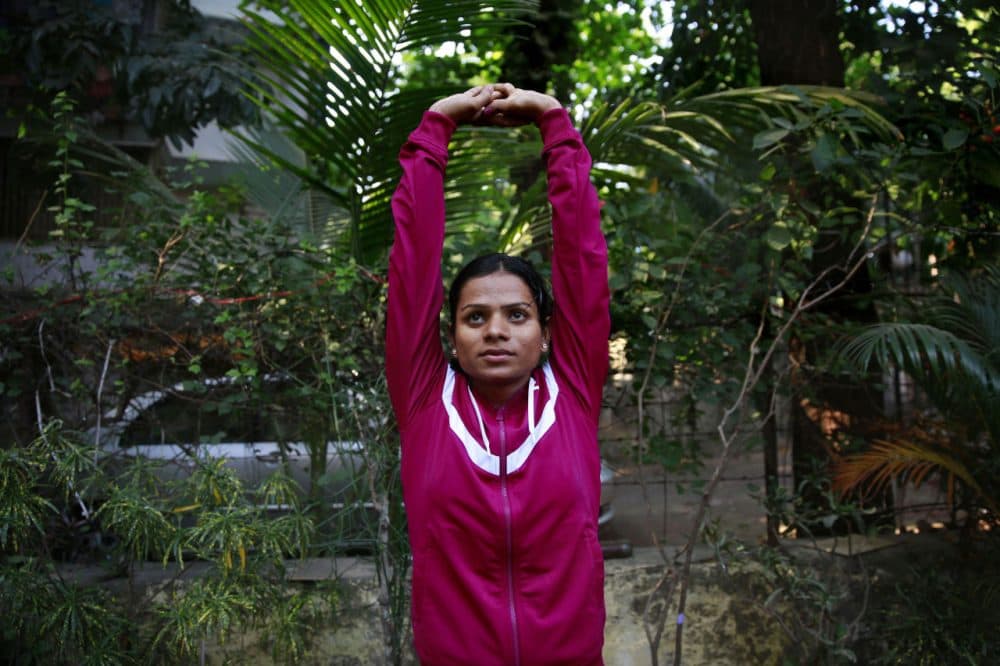Advertisement
Dutee Chand Wins Gender Fight In Track And Field
Resume
Indian sprinter Dutee Chand got a victory this week, not on the track but on the court. Chand was banned last year from competing against other women. Track’s international governing body, the IAAF, said her natural testosterone levels were too high.
Instead of undergoing surgery or taking hormone-suppressing drugs, she opted to fight the decision. And on Monday, sports’ highest international court ruled in her favor.
Juliet Macur has covered this story for The New York Times. She spoke to Only A Game's Doug Tribou.
DT: We've spoken to you about Dutee Chand before, but remind our listeners about her case.
I mean there's so many other things that are variables, it would be hard to pinpoint high testosterone equals a 10-12 percent advantage...
Juliet Macur, NY Times
JM: Well, she naturally has high testosterone, so she was born like this. It wasn't the IAAF at that point, that's the track and field governing body. It was India Sports Authority. They had decided they were going to test her because some competitors said she should not been competing with women, because she was basically a man.
DT: And you'd said to us when we spoke last fall that you were glad it wasn't up to you to decide, and you've even written that you pity the IAAF. Tell us why you feel that way.
JM: It's not a cut and dry case at all, and it's very complicated. You can argue both ways. And I joked with my colleagues the other day, I said, 'Well this is an interesting sort of ending to this case — that they basically didn't rule definitively either way.' The court, of course, said that she's able to compete at least for the next two years. And they said, 'Well come back to us in two years.' And maybe by then there will be a whole different slate of arbitrators who have to look at this case again, because it's just so complicated and so much science, and so many other nuanced issues, that it's very difficult to make a decision that everybody will be happy with.
DT: Right, and so what you're referencing is this ruling that gives the IAAF a couple of years to present new evidence that Chand's elevated testosterone provides an advantage. How likely are they to come up with evidence to support that claim?
JM: The people I've talked to, the experts who have followed this issue, say that it's very unlikely. Not because women with high levels of testosterone don't have a marked advantage. But it's sort of unprovable — or it might be completely unprovable — because there are so many other factors that go into success on the athletic field: you have trainers, what you eat, how much you sleep, your training facility.
I mean there's so many other things that are variables, it would be hard to pinpoint high testosterone equals a 10-12 percent advantage or whatever the Court of Arbitration for Sport is asking the IAAF to find. So they asked a question that might not be able to be answered.
DT: You spoke to a medical geneticist who said he was happy that Chand won her case, but is worried about the future of women in sports. Why is that?
JM: He's basically saying that he's worried that the basis of competing in a women's category will be a women coming up to the starting line and saying 'I am a women, so I can compete.' And he's saying that that is not enough. There has to be a line drawn somewhere. And he basically said that this doesn't clear up anything. It does help Dutee Chand over the next couple of years, but in the grand scheme of things the International Olympic Committee and the Olympic movement have been looking at this issue for decades. And nothing really looks like it's going to be resolved. It might be an unsolvable problem.
DT: Some research has shown that hyperandrogenism is found in about seven out of every 1,000 elite female track athletes. Do you think looking ahead to the future that this is enough to trigger some sort of significant change in how gender is viewed in these international sports competitions?
JM: That is a good question, I don't know the answer to that. It might seem like not that many. But that seven in 1,000 is actually 140 times the regular population. So that means that there is over-representation of athletes with hyperandrogenism in track and field.
This segment aired on August 1, 2015.